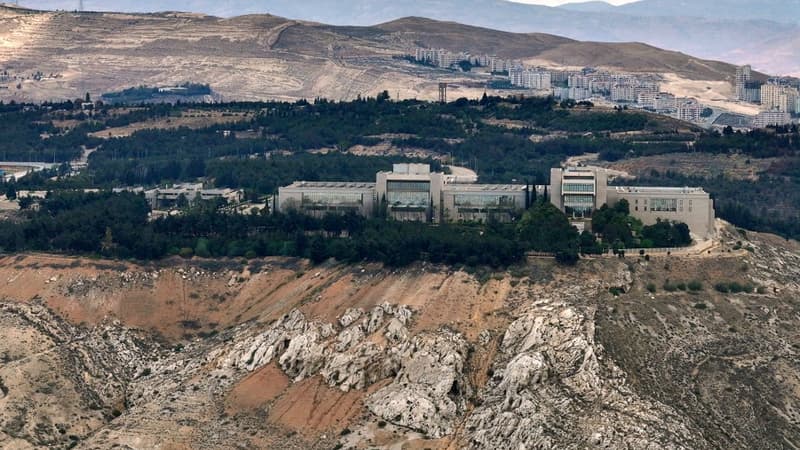More than 20 Israeli attacks attacked military sites in Syria on Friday 2 to Saturday, May 3, the most violent attacks, “said an NGO, after Israel announced a strike near the presidential palace in Damascus.
The official Syrian agency announced that he had been killed to a “civilian”, the Israeli army confirming on the other hand, having directed the military infrastructure near the capital of Syria, a country with which Israel is still in a state of war.
In a statement, the army announced that “he had hit a military site, anti -aircraft cannons and air missile infrastructure in Syria”, without further details. “The Army will continue to act if necessary to defend Israeli civilians,” he added.
“More than 20 Israeli strikes have attacked warehouses and military sites in Deraa, near Damascus and in the Hama and Lttaquié region,” said the Syrian Human Rights Observatory (OSDH), which has a large source network in the war.
The NGO estimated that they were “the most violent since the beginning of the year.” AFP journalists in the capital have heard the roar of airplanes and several detonations.
Sana, who had brought several actions near Damascus and throughout the country, said that “a civilian was killed in Israeli aviation attacks around Harasta, near Damascus.”
Since the fall of President Bashar al-Assad in December, Israel, who considers the new authorities with distrust, has directed hundreds of attacks on military sites in Syria, saying that he wants to prevent arms from falling into the hands of the new authorities describing as “jihadists.” Israel also sent troops to a demilitarized area on the golan plateau.
The protection of the Druse community as a problem?
At dawn on Friday, Israel announced that it had bombarded near the presidential palace of Ahmad al-Chareh, as a warning against any damage to the Drouse minority in Syria. What the Syrian presidency described as “dangerous climb” was also convicted by the UN Secretary General, Antonio Guterres.
This happened after the denominational violence at the beginning of the week between armed groups linked to Syrian power and the fighters of the druse that left more than 100 dead near Damascus and in the south, neighbor Israel, according to the OSDH.
According to the independent analyst Michael Horowitz, Israel “hopes that both find local allies, particularly in southern Syria, but also have the balance at a time when Syria’s future is still uncertain.”
“This is a clear message sent to the Syrian regime. We will not allow forces (Syrian) to be sent south of Damascus or threaten the Druse community,” Prime Minister Benjamin Netanyahu and his defense minister, Israel Katz, said.
Qatar has punished a “shameless assault against sovereignty” by Syria and Saudi Arabia “reaffirmed its categorical rejection of Israeli aggressions that undermine the stability” of Syria. “Syria should not become the patio of recreation for regional tensions” warned Germany, asking for the new Syrian power to guarantee “the protection of the civilian population” and “all actors” to “the greatest moderation.”
Israel had threatened to act “strongly” if Damascus did not protect his Druse community. Since the arrival of power, on December 8, of a coalition led by Sunni Islamists, Israel has assumed the cause of Syrian drusia. This esoteric community, of a Shiite Islam branch, is also found in Israel and Lebanon.
MORTAL VIOLENCE THIS WEEK
In this context, Ahmad Al-Chareh received the Chief of Lebanese Drusos, Walid Joumblatt on Friday, who called his co-religious in Syria on Friday to “reject Israel’s interference.” The OSDH also reported on Friday of four Druss combatants killed during the day in a drone strike in the province of Soueïda, a bastion of the Drouse minority in the south, without specifying its origin.
Monday and Tuesday, violence in Jaramana, in the suburbs of Damascus Druze, in Sahnaya, 15 kilometers from the capital, where Druzes and Christians live, and in Soueïda, they killed 102 in both fields, according to the OSDH.
These fights were triggered by an attack by armed groups affiliated with power in Jaramana, after the transmission of an audio message attributed to a Dusel and alleged blasphemous with respect to the prophet Muhammad.
On Thursday night, the most influential Duse leader in Syria, Cheikh Hikmat al-Hajri, had denounced a “genocidal campaign” aimed at “civilians” of his community. Syrian authorities, which since then have reaffirmed their “firm commitment to protect all the components of the Syrian people, including the Druse community,” have challenged elements that escape their control.
These fights aroused the spectrum of massacres that had made more than 1,700 dead in early March, the vast majority of the members of the Alaouite minority, of which the fallen president arrived in the West.
Source: BFM TV


